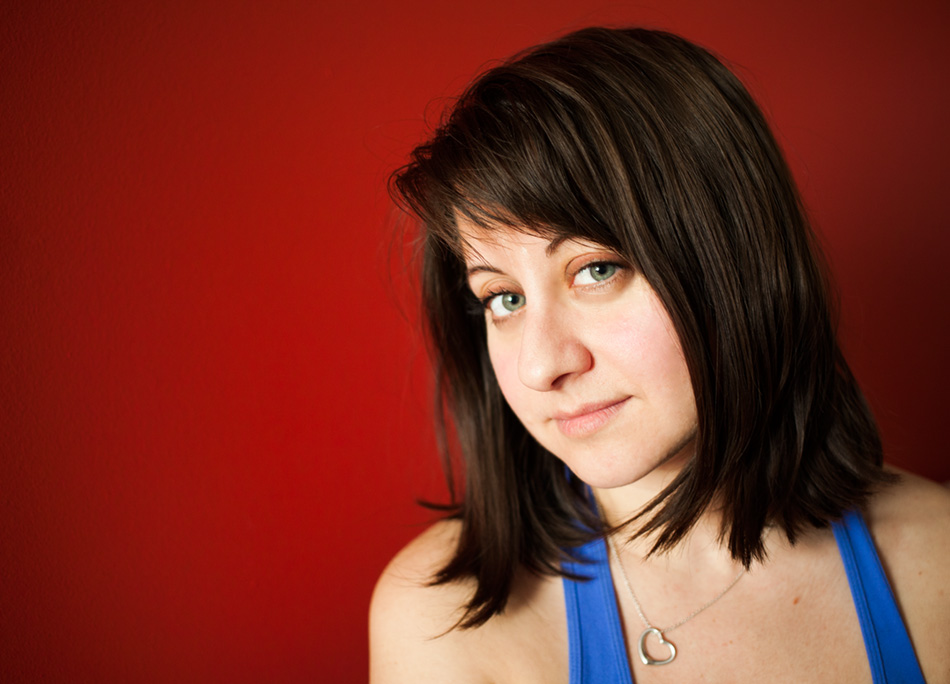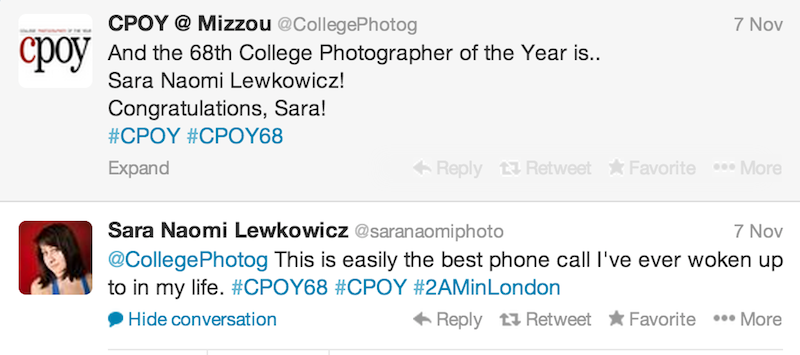
Photo by Melissa Golden
Q. Congratulations on being named the 68th College Photographer of the Year. What does that mean to you?
A. It means that I was lucky enough to be grouped in with some of the best photo students in the world, and then the judges suffered a case of temporary insanity and gave me the gold award. Seriously, the talent and the caliber of work this year was insane. I still can't believe it's actually really happening.
Q. Do you think photojournalism is still needed?
A. Photojournalism is important because it's a useful tool. Photographs are tools that other people can use to engage in discussion and affect real social change, and to foster empathy and understanding. It's also a tool that can be used to inform and encourage further information-seeking. The photos can be used to illustrate serious and often abstract or foreign issues that people sometimes have difficulty grasping at first.
Q. You won two gold medals before the big title, how did you learn about them? What was your first reaction?
A. Actually, I found out both times because people messaged me on Facebook congratulating me. I can't watch those things (the CPOY screencasts), it's too nerve-wracking. I was in Denmark talking at a conference held by the Danish Union of Press Photographers, and I started getting a few messages when my phone picked up wifi. It was very exciting, I'd never even entered CPOY before, I never had the guts. I always used to talk myself out of entering anything, including CPOY. I always sabotaged myself and "forgot" the deadline.
Q. It can't be missed that Shane and Maggie's story got a lot of attention since February, why do you think it made that kind of impact?
A. I think that whenever people see something intimate, something like domestic violence, which is such a private crime, they have a very visceral reaction. I also think that when people look at the photos, they identify with either Maggie, Shane, the kids, or me. Who a person identifies with often says a lot about them. How they react to the photos often says a great deal as well.
Q. What did it take you to pursue and capture the story? Have you ever thought of giving up?
A. The story was originally about recidivism, not domestic violence. Once the story switched gears and became about domestic violence, I was motivated to continue it because I felt that there is a strong need for a story about domestic violence as a process. I also didn't want to only portray Maggie as a victim. I wanted to show her for who she is, and who she is is brave, wise-beyond-her-years, strong, a loving mother…she's a complex, nuanced person, and I felt that simply portraying her as the survivor of this awful event didn't do her justice, nor did it speak to the empowering aspects of her story. I still haven't given up. I talked to her this evening, we're making plans for my next visit when I return to the states.
Q. What projects are you working on recently?
A. I am currently working on two projects while I study in London, one about white Anglo women who convert to Islam, and one about the 25th Anniversary of the Lockerbie bombing. I have a few other ideas I'm playing around with, but for right now I'm trying to quiet my ADHD brain somewhat and focus on these two projects.
Q. Where do you think you're going from here?

A. I'm trying to take it one year at a time, because lord knows I didn't see myself being here this time last year. Things change quickly. If I could continue to do in-depth, intimate storytelling, and expand my skill sets to other arenas of photography/multimedia that will be challenging and rewarding, well, that's the dream, isn't it?
Q. Who are some photographers who especially inspire you, and why do you admire them?
A. I look a lot at the work of my contemporaries and friends, as well as photographers who are well-established. Maisie Crow is a very close friend of mine, and continually blows me away. I love Rineke Dijkstra's portraiture, I love Todd Heisler's storytelling, I love pretty much anything Diana Markosian does. I saw Anastasia Taylor-Lind speak at the same conference in Denmark and was blown away by her skill as a photographer and her intelligence and humor. Donna Ferrato has been an incredible inspiration to me from afar for years, and is now someone who I am lucky to have a real-life friendship with. Melissa Lyttle is someone who just knows how to shoot, without bells or whistles or fancy toning tricks, just incredible access and content and storytelling skills. She just gets it. Pete Muller is doing incredible work in Africa right now. Stephanie Sinclair's work on child brides pretty much sets the gold standard for work that is impactful, broad, and beautifully shot. Eugene Richards is my hero in a lot of ways. Brenda Ann Kenneally. Lynn Johnson. Emillio Morenatti. And hell, just looking through the CPOY winners this year was inspiring (and kind of terrifying). There's so much good work out there. (hence why I don't give a flip about people who say photojournalism is dead).
Q. What would be your advice to college photographers?
A. This is going to sound weird, but stop competing with everyone else around you. I don't mean don't enter contests, contests are fine, and are what they are…but realize they aren't the be-all, end-all. My friend Logan Mock-Bunting wrote this on Facebook the other night:
"Photography is more than exposure and composition and timing. It is about the experiences your subjects+you share, and communicating to others. Those are intangibles that Medals can't be hung on. "Success" will be different for every person."
I completely agree with that. I shot for ten years before I did anything anyone noticed. Of course accolades are nice and can get editors to email you back...but they aren't the way to do good, important work. They wont make further good work magically materialize. Only going out and shooting will.
I spent SO LONG feeling so insecure about my work, and I still struggle with that, except now it motivates me, rather than paralyzes me. That's an important distinction. I was never on the "A" team as an undergrad studying photojournalism, I just wasn't very good. And I let that fact paralyze me for years, I internalized it. I couldn't figure out how to gain access and do photo stories and was convinced I just didn't have that talent. Then I found one story that I've been working on for three years now, and something clicked. And now long form stories are, bar none, my favorite projects (whether in still or multimedia form, doesn't matter).
The best thing I ever learned was to compete primarily with myself, looking at my work over time. To try to shoot better than I did last year. I'm still learning. Having one story and a few awards doesn't make a person bonafied. It just means you shot a good story. A lifetime of dedication does, and that only comes with time. I know it might sound hypocritical coming from me, all I'm saying is that an award is just another tool in your career.
Q. Any final words?
A. There's a really great (and a bit lengthy) Ira Glass quote that says it way better than I can, because, well, he's Ira Glass. So I'll just leave you with that (I know lots of people already know it but whatever, it's still great):
"Nobody tells this to people who are beginners, I wish someone told me. All of us who do creative work, we get into it because we have good taste. But there is this gap. For the first couple years you make stuff, it’s just not that good. It’s trying to be good, it has potential, but it’s not. But your taste, the thing that got you into the game, is still killer. And your taste is why your work disappoints you. A lot of people never get past this phase, they quit. Most people I know who do interesting, creative work went through years of this. We know our work doesn’t have this special thing that we want it to have. We all go through this. And if you are just starting out or you are still in this phase, you gotta know its normal and the most important thing you can do is do a lot of work. Put yourself on a deadline so that every week you will finish one story. It is only by going through a volume of work that you will close that gap, and your work will be as good as your ambitions. And I took longer to figure out how to do this than anyone I’ve ever met. It’s gonna take awhile. It’s normal to take awhile. You’ve just gotta fight your way through.”
Interview by Hany Hawasly







